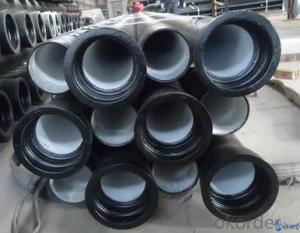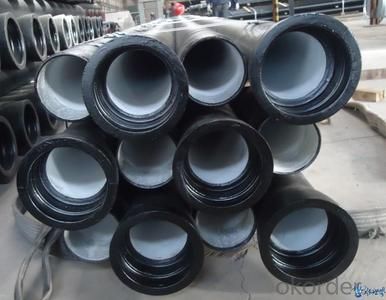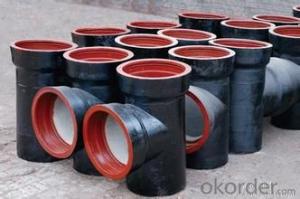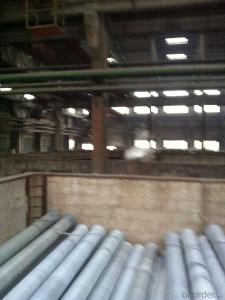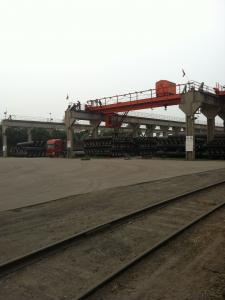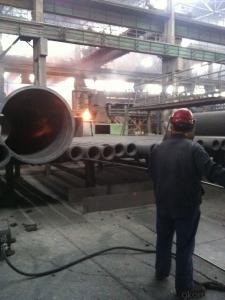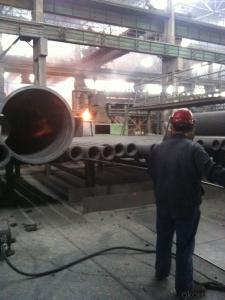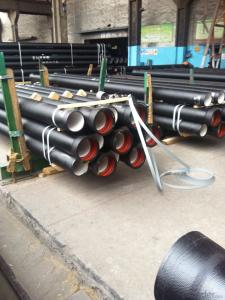DUCTILE IRON PIPES AND PIPE FITTINGS K9 CLASS DN100
- Loading Port:
- Tianjin
- Payment Terms:
- TT OR LC
- Min Order Qty:
- 22 pc
- Supply Capability:
- 3000 pc/month
OKorder Service Pledge
OKorder Financial Service
You Might Also Like
Material : Ductile Cast Iron
Size Range : DN 80mm to DN 2000mm
Unit Effective Length : 6m or 5.7m
Manufacture Standard: ISO 2531:1998/ EN 545:2006/EN 598:2007
Annual capacity : 200,000 tons
Coating Exterior: Zinc 130g/m2 according to ISO 8179-1 and bitumen coating 70 microns.
Cement Interior: Portland Cement/ High Alumina Cement/ Sulphate Resisting Cement Lining according to ISO 4179
Special requirements on external coating and internal lining can be applied
We also provide accessories such as SBR/EPDM rubber gaskets, lubricant paste, pipe caps, PE sleeves, etc.
Additional Parts:
Each pipe is strictly inspected according to related standard to ensure permanently high performance.
Easy Installation at site and service free for life
Long Service Lifespan
Quotation will arrive you within 24hours once we get your inquiry.
We guarantee offering you a competitive price.
A copy of original inspection reports of pipes will be offered after shipment.
Photos of loading process will be sent to the customer after shipment effect.
We will follow-up the delivery progress after shipment effect and update to the customer on weekly basis.
- Q: How do ductile iron pipes perform in sandy soil conditions?
- Ductile iron pipes perform well in sandy soil conditions due to their inherent strength and durability. The material's high tensile strength allows it to withstand the pressure exerted by the surrounding soil, preventing pipe deformation and breakage. Additionally, the corrosion resistance of ductile iron ensures a longer lifespan, even in corrosive sandy soil environments.
- Q: Can ductile iron pipes be used for offshore oil and gas installations?
- Yes, ductile iron pipes can be used for offshore oil and gas installations. Ductile iron is a type of cast iron that offers excellent strength and durability, making it suitable for various applications including offshore environments. These pipes have high tensile strength and are resistant to corrosion, making them ideal for transporting oil and gas in harsh offshore conditions. Ductile iron pipes are often used for subsea pipelines, risers, and flowlines due to their ability to withstand high pressures and resist external forces such as waves, currents, and impacts. They are also capable of handling the high temperatures and pressures associated with offshore oil and gas production. Furthermore, ductile iron pipes have a long service life and require minimal maintenance, reducing the overall operating costs for offshore installations. They are also readily available and cost-effective compared to other materials such as steel. However, it is important to consider factors such as the specific requirements of the project, environmental conditions, and the compatibility of ductile iron with other materials used in the offshore installation. Proper engineering analysis and design considerations should be undertaken to ensure the suitability and safety of ductile iron pipes for offshore oil and gas installations.
- Q: Are ductile iron pipes suitable for mining applications?
- Yes, ductile iron pipes are suitable for mining applications. Ductile iron is a type of cast iron that has been treated to enhance its strength, durability, and ductility. These pipes are known for their high tensile strength and resistance to corrosion, making them ideal for underground mining operations where they may be exposed to harsh conditions. One of the key advantages of ductile iron pipes in mining applications is their ability to withstand high pressure and heavy loads. They have excellent structural integrity and can resist both internal and external forces, ensuring reliable performance in demanding mining environments. Additionally, ductile iron pipes have a long service life and require minimal maintenance. They are highly resistant to abrasion, which is crucial in mining operations where abrasive materials like rocks, minerals, and ores are present. The smooth inner surface of these pipes also minimizes friction, allowing for efficient transportation of mining materials. Moreover, ductile iron pipes are cost-effective compared to alternative materials like steel or concrete. They have a lower upfront cost and require less frequent replacements, resulting in reduced long-term expenses for mining companies. In conclusion, ductile iron pipes are well-suited for mining applications due to their strength, durability, resistance to corrosion and abrasion, long service life, and cost-effectiveness. These pipes provide reliable and efficient transportation of mining materials, contributing to the overall efficiency and productivity of mining operations.
- Q: How does ductile iron pipe perform in high-temperature steam applications?
- In high-temperature steam applications, ductile iron pipe performs admirably. Ductile iron, renowned for its strength and durability, possesses the capability to endure high pressures and temperatures. When subjected to high-temperature steam, ductile iron pipes retain their structural integrity and are not easily deformed or cracked. They possess a remarkable resistance to thermal expansion and contraction, rendering them suitable for situations where temperature fluctuations are common. Furthermore, ductile iron pipes exhibit exceptional corrosion resistance, a crucial characteristic in steam applications where the presence of moisture can accelerate corrosion. All in all, ductile iron pipes are a dependable choice for high-temperature steam applications, delivering enduring performance and ensuring the secure and efficient transportation of steam.
- Q: What are the requirements for the hydrostatic test of ductile iron pipes?
- The pipe work pressure P is less than 0.5MPa, the test pressure is 2P, the pipe work pressure is greater than 0.5MPa, the test pressure is P+0.5. After the water pressure rises to the test pressure, the pressure is fixed for 10 minutes, and the pipe joint and the pipe body are not damaged and leaked.
- Q: Are ductile iron pipes suitable for installation in areas with high soil compaction?
- Indeed, areas with high soil compaction can accommodate the installation of ductile iron pipes. Renowned for their robustness and longevity, ductile iron pipes exhibit remarkable resistance against external loads and pressures. Their inherent pliability enables them to endure the strains caused by intense soil compaction. Furthermore, ductile iron pipes possess a substantial modulus of elasticity, enabling them to retain their form and structural soundness even when subjected to substantial burdens. Consequently, they present themselves as an exceptional option for regions with high soil compaction, as they adeptly manage the force and deliver dependable and enduring functionality.
- Q: What is the excavation width of ductile iron pipes with diameters greater than 1400?
- Then, according to the soil characteristics, different slopes are calculated, and the width of the excavation is calculated according to the depth and slopeIf the soil is soft, high water content and easy to collapse, the excavation width will be wide, otherwise the slope will be steep and the excavation width will be narrow
- Q: What is the expected pressure rating for ductile iron pipes?
- The expected pressure rating for ductile iron pipes typically ranges from 150 to 350 psi.
- Q: How does ductile iron pipe perform in areas with high ground movement?
- Areas with high ground movement are well-suited for the exceptional performance of ductile iron pipe. Its unique properties and design ensure a high resistance to deformation and damage caused by ground shifting, settling, or seismic activities. The material's ductility enables it to withstand significant stress and strain without fracturing or breaking, setting it apart from rigid materials like cast iron or PVC. Ductile iron pipe's ability to flex and absorb ground movement prevents catastrophic failures and guarantees the integrity of the pipeline system. Moreover, ductile iron pipe is manufactured with various joint configurations that enhance its performance in areas with high ground movement. Flexible joints, like restrained or mechanical joints, effectively accommodate movement by allowing limited rotation and translation, minimizing the risk of pipe separation or joint failure. Additionally, the robust construction of ductile iron pipe, featuring a thick wall thickness and high tensile strength, offers added protection against ground movement. This strength enables the pipe to withstand external loads and forces induced by the ground, maintaining its structural integrity and preventing deformation. To summarize, ductile iron pipe is an excellent choice for areas with high ground movement due to its exceptional ductility, flexible joints, and robust construction. Its ability to absorb ground movement while ensuring the functionality and safety of the pipeline system establishes it as a reliable and durable option in challenging environments.
- Q: What material is ductile cast iron 235A?
- Ductile iron is a pig iron
Send your message to us
DUCTILE IRON PIPES AND PIPE FITTINGS K9 CLASS DN100
- Loading Port:
- Tianjin
- Payment Terms:
- TT OR LC
- Min Order Qty:
- 22 pc
- Supply Capability:
- 3000 pc/month
OKorder Service Pledge
OKorder Financial Service
Similar products
Hot products
Hot Searches
Related keywords
